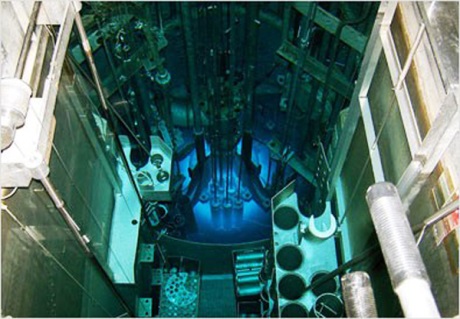A Canadian-US partnership has been announced to create a "new, reliable supply" of medical isotopes for use worldwide.
 |
| The MURR research reactor (Image: University of Missouri) |
Canada's Nordion and its US parent company Sterigenics International signed partnership agreements on 20 February with the USA's General Atomics (GA) and the University of Missouri Research Reactor Center (MURR).
Through the agreements, sterilization specialist Sterigenics and radioisotope supplier Nordion will be supplied with molybdenum-99 (Mo-99) produced in MURR's research reactor using targets incorporating low-enriched uranium (LEU) supplied by GA.
This new medical isotope supply will be produced using GA's Selective Gaseous Extraction (SGE), which uses a product gas to convert Mo-99 from solid to gas in the fuel. This gas is removed from the target and collected for processing and purification. The company says this process brings several important advantages: reduced fuel requirements and waste due to continued use of the LEU fuel target, reduced time from Mo-99 production to market, use of existing generator and downstream infrastructure, simplified operations relative to uranium dissolution processes, and reduced unit cost which supports full cost recovery efforts.
At 10 MWt, MURR's "tank in pool" type reactor is the USA's largest university research reactor. According to the University of Missouri, "MURR currently produces more reactor-produced radioisotopes for biomedical researchers and human medical applications in the US than any other domestic entity, including the entire US Department of Energy."
In a statement, Nordion said project planning and pre-work is well underway and the partners expect to begin the routine supply of radioisotopes in 2017.
Nordion's current supply of Mo-99 is from the National Research Universal (NRU) reactor at Chalk River, Ontario, operated by Canadian Nuclear Laboratories. However, the NRU is scheduled to cease routine production of Mo-99 in November 2016. The Canadian government announced recently that it will support the extension of NRU operations until the end of March 2018 to help support global medical isotope demand in the unexpected circumstances of shortages during this time.
Nordion's president for medical isotopes Tom Burnett said, "Nordion has found what it believes is the best global solution for the industry - a combination of our best-in-class medical isotope capabilities, with the world-class nuclear reactor and innovative target design expertise of General Atomics and the unparalleled reliability of the University of Missouri Research Reactor (MURR), a leading US research reactor centre and radioisotope supplier."
He added that the partnership "will ensure Nordion has a secure long-term supply of medical isotopes, which will consolidate our leadership position in this business. That is great news for our company, for our employees, our customers and patients around the world."
Mo-99 is used in medical equipment to generate technetium-99m, the most widely used isotope in nuclear medicine. Molybdenum-99 has a half-life of only 66 hours, meaning that supplies need to be constantly replenished.
Researched and written
by World Nuclear News







_94566.jpeg)






